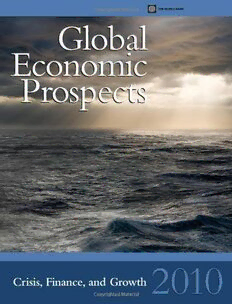
Global Economic Prospects 2010: Crisis, Finance, and Growth PDF
186 Pages·2010·3.915 MB·English
Most books are stored in the elastic cloud where traffic is expensive. For this reason, we have a limit on daily download.
Preview Global Economic Prospects 2010: Crisis, Finance, and Growth
Description:
This report explores both the short- and medium-term impacts of the financial crisis on developing countries. It presents evidence that the financial boom played a critical role in the growth boom experienced by developing countries between 2003 and 2007, but that tighter conditions in the future are expected to result in weaker growth over the next 5 to 15 years. Although global growth has resumed, the recovery is fragile, and unless business and consumer demand strengthen, the world economy could slow down again. Even if, as appears likely, a double-dip recession is avoided, the recovery is expected to be slow. High unemployment and widespread restructuring will continue to characterize the global economy for the next several years. Already, the crisis has provoked large-scale human suffering. Some 64 million more people around the world are expected to be living on less than a $1.25 per day by the end of 2010, and between 30,000 and 50,000 more infants may have died of malnutrition in 2009 in Sub-Saharan Africa, than would have been the case if the crisis had not occurred. Over the medium term, economic growth is expected to recover. But increased risk aversion, a necessary and desirable tightening of financial regulations in high-income countries, and measures to reduce the exposure of developing economies to external shocks are likely to make finance scarcer and more costly than it was during the boom period. In the longer term, however, developing countries can more than offset the implications of more expensive international finance by reducing the cost of capital channeled through their domestic financial markets.
See more
The list of books you might like
Most books are stored in the elastic cloud where traffic is expensive. For this reason, we have a limit on daily download.
